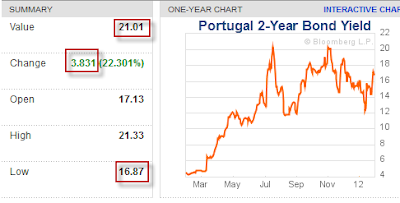German retail sales fell unexpectedly in December, dropping 1.4 percent on a monthly basis in real terms, preliminary data showed on Tuesday.More Amusement
The notoriously volatile indicator was down 0.9 percent on an annual basis. Economists polled by Reuters had forecast retail sales to rise 0.9 percent on the month and 2.3 percent on the year.
November retail sales were revised downwards to a fall of 1.0 percent on the month, from a previously reported decrease of 0.9 percent. On an annual basis sales were also revised downwards to a gain of 0.9 percent from 1.4 percent.
I am even more amused by Barclays Capital Research (via email) that suggests "household consumption to be a major GDP growth driver in 2012."
German retail sales (real, sa, excluding cars/petrol) unexpectedly fell again in December, by 1.4% m/m (-0.9% y/y), according to the Federal Statistical Office (Destatis). The weak November figure was slightly revised down to -1.0% from a previously reported -0.9%. On average, retail sales in Q4 2011 were 0.7% below their level in Q3 2011 in real terms, indicating a weak performance of household consumption in last year's final quarter.Household Consumption Major GDP Driver?!
In nominal terms, food and non-food sales both rose 0.3% (y/y), but food sales fared significantly worse in real terms (-1.7%, y/y) than non-food items (-0.5% y/y), reflecting higher food prices. Among non-food items, sales of home furnishings and fixtures and building materials stood out, growing by 3.6% in real terms (y/y), indicating continued strong activity in residential construction in Germany.Improving consumer sentiment, as reported by GfK, suggests that the notoriously volatile retail sales could pick up again soon. We expect household consumption to be a major GDP growth driver in 2012.
Points of Contention
- My reaction to Barclays is "Please be Serious". It is quite obvious that Europe is in a recession already.
- It is also obvious that austerity measures in Greece, Portugal, Spain, and France will deepen the recession.
- It is equally obvious the recession will be long and deep.
- Finally, given that Germany depends on exports, especially to European countries, it should be obvious that Germany will be impacted, much more than economists and analysts think.
Then again, in reference to number 4 above, that is precisely why the falloff in retail sales was "unexpected" in the first place. Analysts and economists crunch numbers, looking in the rear view mirror instead of thinking ahead.
Watch for analysts' reports in the months ahead to comment on "unexpected" declines in German consumer sentiment, further "unexpected" declines in German industrial output, further "unexpected" drops in GDP, and further "unexpected" drops in retail sales.
Bear in mind, given the above cited "volatility" in retail sales, we just might see an unexpected "rise" in German economic numbers for a month or so. If so, don't make anything of it. It won't last.
Math Addendum
If it's fair for me to criticize Barclay's it is equally fair for them to criticize me.
In response to Greek Bond Math (Assuming the Deal Goes Through) ; Merkel Faces Backlash Over Deal; Political Zugzwang I received an email from a credit analyst at Barclays who prefers to remain anonymous. Here are his personal thoughts ...
The majority of the 145bn is for paying down existing debt, it is not additional debtMike "Mish" Shedlock
Current debt ~330bn split 120bn/210bn public/private
Post restructuring ~220bn split 120bn/100bn public/private
The 145bn then pays off ~80bn of the publicly held debt that matures + government deficit over 8 years + recapping the Greek banks (45bn)
So the net the government debt would end up at ~285bn (220+145-80)
Your basic point stands (debt is unsustainable), but worth getting the numbers right.
http://globaleconomicanalysis.blogspot.com
Click Here To Scroll Thru My Recent Post List













